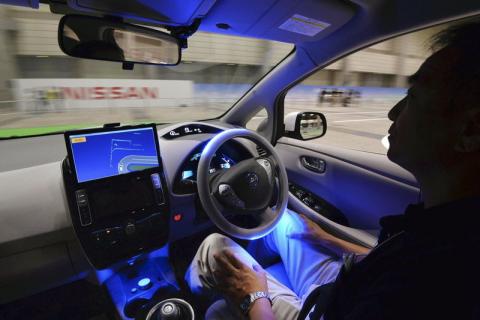Coming soon – the world of driverless cars
1,000 times faster
At the RAV Lab, Shiller and his students developed a small mobile robot that maneuvers between obstacles at high speed, showing how the driverless car would handle itself. “I haven’t seen a similar robot moving as fast,” says Shiller. “This stems from our ability to compute the optimal velocity that exploits the robot’s motion capabilities.”
A couple of years ago, they published their results from testing a simple version of this algorithm against one developed at the Massachusetts Institute of Technology (MIT), where Shiller earned graduate degrees in mechanical engineering. “Our algorithm computes a collision-free path among 70 tightly spaced obstacles in half a millisecond, compared to 500 milliseconds (0.5 seconds) it took the algorithm from MIT,” he reports. “That’s 1,000 times faster!”
RAV Lab’s technology could be one of a few systems for driverless cars to come out of Israel, addressing everything from motion planning to cyber-security. Among the companies working on self-driving car technologies is Jerusalem-based Mobileye, whose driver-assistance software is already built into approximately 3.3 million vehicles worldwide. Mobileye reportedly is collaborating with American electric car manufacturer Tesla on developing its driverless vehicle.
Shiller says that one of the most difficult functions to automate is the three-dimensional mapping system to take the place of human perception in identifying and avoiding moving and stationary hazards in the car’s vicinity. “Researchers are still working on this,” says Shiller. “Once we map the region around the vehicle, we can use this information to do the next part, which is planning the vehicle’s motion. That’s where my research comes in.”
Making life easier
Over the years, Shiller’s students have produced robots that climb stairs, clean windows, operate wheelchair lifts, dispense pills, push baby strollers uphill, turn pages and accomplish other everyday tasks. They’ve built up an impressive portfolio of almost 90 innovative robotic products over the last 10 years to solve daily life problems in a futuristic way. “Some of these are world firsts,” says Shiller.
The RAV Lab’s research has been supported by Israel’s ministries of science, transportation and defense, the Israeli Space Agency, General Motors and the Paslin Foundation. As head of the Israeli Robotics Association (IROB), Shiller is optimistic that Israel can become a world leader in smart robotics.
“Quite a few of the Israeli robotics companies are world leaders in their fields,” he says, citing examples such as Robomow, the Dolphin swimming pool cleaner, the SpineAssist surgical device, Mobileye and the ReWalk exoskeleton. “The research we do in Israel is state of the art,” says Shiller. “I believe that if we build upon the infrastructure developed over the last 25 years in the remarkable Israeli high-tech industry, we can become world leaders in robotics as well.”
Abigail Klein Leichman

